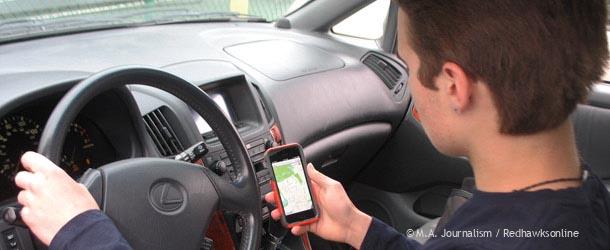While GPS systems help students navigate where they’re going, the risks and drawbacks associated with them may outweigh the benefits
“We were in Europe over Christmas break because I’ve got a brother who lives in Switzerland,” said AP English 11 teacher Ken Myhre. “We spent some time with them, and then my wife, daughter and I were going to travel to Austria. So we get in the rental car and we’re driving to Austria, and I programmed the GPS device to get us there but it kept trying to take us off the freeway. Every time we’d come to a ramp it would want us to get off, even though we knew we should stay on the autobahn. Finally I just said ‘Alright, I’m just gonna do it” and we ended up in the middle of Liechtenstein, which is this tiny little European country. It was just a hoot!”
While most people don’t often get lost to the point of ending up in another country, the situation is not uncommon: getting lost, misdirected or told to go an inconvenient route due to a GPS (global positioning system) device, whether it be in-dash or a smartphone. GPS devices are becoming more and more common among drivers, and while they’re useful in directing people to unfamiliar destinations they also lead to questions about whether or not young drivers are capable of getting places and understanding their surroundings without one.
The GPS is a satellite navigation system. Initial developments began as early as 1972, and after many trials it became available for civilian use in the United States in 1996 (GPS devices were previously only available for military use). The GPS system is constantly being tweaked and improved, and was adapted for mobile phone use in 2004. Many Minnehaha students have smartphones and utilize their GPS capabilities, though these applications have both benefits and faults.
Junior Noah Tuck lives in Minneapolis and only uses his iPhone’s GPS if he’s “going somewhere I don’t know as well like the north side or the suburbs,” said Tuck. “I don’t really use it in Minneapolis though because I know it really well.”
Tuck finds the GPS on his phone useful to get him to places he’s unfamiliar with, but that doesn’t mean the trip is always smooth.
“Siri gets me lost,” said Tuck of the iPhone’s knowledge navigator. who says directions out loud based on Google maps. “One time I was trying to get on the highway and she took me onto a dirt road.”
Siri, along with other GPS devices, gives directions step-by-step. This feature is attractive to many students who don’t know how to read a map (as opposed to the time before GPS devices, when maps and state atlases were often stashed in the gloveboxes of cars). However, this feature can also be hazardous.
The GPS feature tempts drivers to constantly check their phones for the next direction, which can be as dangerous as texting and driving.
This is a phenomenon known as “distracted driving” (see sidebar).
Senior Natalie Welsch has neither a GPS device nor a smartphone, which means that she prints directions off of MapQuest if she is unfamiliar with the area she’s driving to. Following written or memorized directions is safer than using a cell phone, and also increases the driver’s sense of direction.
“I’m not distracted by looking at my phone or trying to [get directions] while I’m on the road,” said Welsh. “I have to do it ahead of time. Disadvantages [are] I can’t just decide to go somewhere while I’m away from a printer, and if I do get lost it’s not going to adjust and I have to go back and find somewhere where I know where I am.”
Many teens get so fixated on following the GPS’ directions that they abandon their natural sense of direction. Welsch and senior Berit Niederluecke recently had a misadventure due to following a GPS.
“Berit has a GPS and we were trying to get to Cupcake Minneapolis and she got the address offline,” said Welsch. “She plugged the address in the wrong order and didn’t realize it, so I drove two hours away to this suburb we had never been to. I knew it wasn’t right, but the GPS said so [so we followed it].”
There are certainly advantages and disadvantages to using GPS devices, but having a basic understanding of which direction to go is important and will help avoid future “GPS nightmares.” On the flip side, perhaps technology’s advancement is leading away from the need to be able to read maps.
“I can ask my son, ‘Where are we, and where is that?’ and he doesn’t know whether something is north, south, east or west,” said Myhre. “He has no idea and it’s ironic. Now, is that a bad thing? I don’t know. We’ve gotten beyond the need for the hunter-gatherer to know which direction is home, so maybe it’s not critical, but something gets lost.”
The technology involved in GPS systems will only get more advanced and more integral to society as time passes, though there is still unquestionable value in understanding one area in relation to another. However, if GPS devices are necessary, make sure they’re programmed correctly to avoid ending up in Liechtenstein.
“The route got us exactly where we [wanted to go],” said Myhre with a laugh, “but it wasn’t until the next day when I actually dug into that GPS and looked and saw that the box for avoiding the autobahn was checked.”

